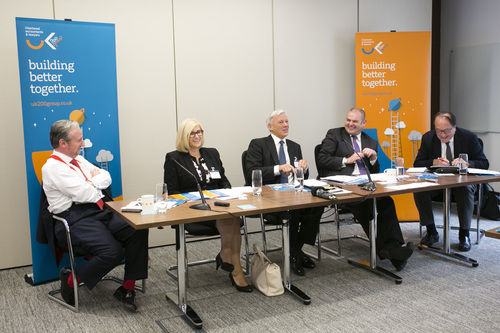Manufacturing Quality: Key EU Referendum Questions Answered
As part of its commitment to the small and medium-sized enterprise (SME) business community, the UK200Group has launched its Campaign for Clarity ahead of the EU Referendum on June 23.
With this in mind, the UK200Group asked its members and their clients to contribute their most important business questions to a document that was then submitted to Britain Stronger in Europe and Vote Leave. The answers were received between May 12 and 24 2016 and are documented in the report.
The UK200Group, established in 1986, represents a significant group of trusted, quality-assured business advisers – chartered accountants and lawyers – who have over 150,000 SME clients in total. As such, the UK200Group acts as the voice for 1,500 charities, over 10% of all registered academies, more than 3,700 farms, 800 healthcare businesses and over 500 property and construction professionals.
Below are the answers to the key manufacturing question. The Remain camp, as the nearest to status quo, has had its answers listed first, followed by those of the Leave camp.
The UK200Group is impartial in the EU referendum debate and seeks only to provide clarity to its members on issues that will affect them. As such, the following answers are provided verbatim from Britain Stronger in Europe and Vote Leave and are combined for the first time in this document.
1. Quality assurance is a way of preventing mistakes or defects in manufactured products and avoiding problems when delivering solutions or services to customers. Does the prospect of remaining in the EU and the distraction of compliance with ever-increasing byzantine rules and regulations mean that customer focus and the ability of SMEs to be agile, responsive and flexible, will continue to be eroded?
Remain:
Leaving the EU will not reduce red tape for small businesses. The single market is Britain’s home market, and our businesses need unfettered access to its 500 million consumers. As part of this access, the UK accepts a set of rules and regulations that provide a level playing field for businesses across Europe.
These regulations are necessary for the functioning of the single market, and the EU Commission is currently taking action to streamline the rules.
If Britain wants to trade with the single market on the terms we currently have, we need to accept the rules.
It is vital for us to ensure that a strong British voice continues to be heard in the EU’s institutions to advance the interest of small businesses. The UK Government is very influential in the EU, and its positions on red tape and business regulation are informed by the views of small businesses. There are also small business membership organisations at EU-level, where small businesses can engage to ensure their voice is heard by EU policymakers.
If we left the EU, Britain would no longer enjoy this vital influence, but we would still have to comply with EU regulations in order to trade with the single market. We would be rule takers, not rule-makers.
Leave:
EU membership obliges UK businesses, regardless of whether they export to the EU, to follow whatever absurd rules that add to cost in the name of consumer rights. If we take back control, the Government can pass consumer protection legislation that is itself fit for purpose, and stop bizarre or wasteful EU rules while also ensuring UK consumers have access to a greater diversity of international products available to buy at cheaper prices.
Where rules help protect UK consumers, or give UK consumers rights that are reasonably useful and realistically providable by producers and retailers, we expect the Government to retain those rules. We could either choose not to repeal them after we leave, or legislate for them in a new UK Act. On the other hand, bizarre, absurd, wasteful and unreasonable rules could be repealed by the UK Government. If the Government tries to restrict consumer rights in a way that consumers disagree with, or fail to act where a dangerous product emerges, we could vote them out of office.
The full report can be found here: http://www.uk200group.co.uk/web/FILES/EU_Questions_answers_v... .
A video of the media briefing that launched the report can be found here: https://www.youtube.com/watch?v=K-fHaWkALac .
Useful links:
The UK200Group: http://www.uk200group.co.uk/
Campaign for Clarity 30 Questions and Answers report: http://www.uk200group.co.uk/web/FILES/EU_Questions_answers_v...
Media briefing video: https://www.youtube.com/watch?v=K-fHaWkALac
Britain Stronger in Europe: http://www.strongerin.co.uk/
Vote Leave: http://www.voteleavetakecontrol.org/
ENDS
Media information provided by Famous Publicity. For further information, please contact George Murdoch on 0333 344 2341 or george@famouspublicity.com, Adam Betteridge on 0333 344 2341 or adam@famouspublicity.com or Tina Fotherby on 07703 409 622 or tina@famouspublicity.com.
On May 11, the UK200Group hosted a debate at which 30 questions from SME owners were given to leading politicians, who discussed the implications of a Remain or Leave vote. The questions were then given to the official Remain and Leave campaigns, and the report was put together between 12 and 24 May.
About the UK200Group:
The UK200Group was formed in 1986, and is the UK’s leading association of independent chartered accountants and law firms, with connections around the world.
The association brings together around 150 member offices in the UK with more than 500 partners who serve roughly 150,000 business clients. Its international links in nearly 70 countries give its members access to expertise across the globe.
